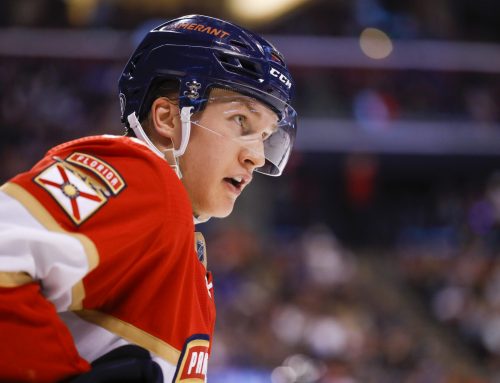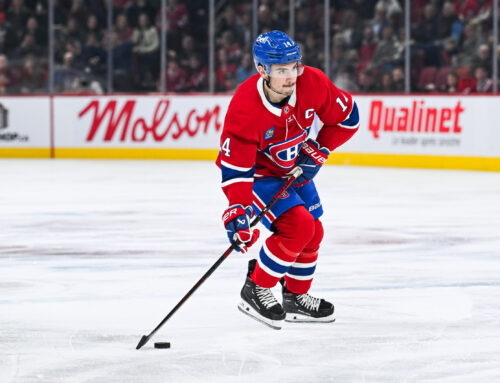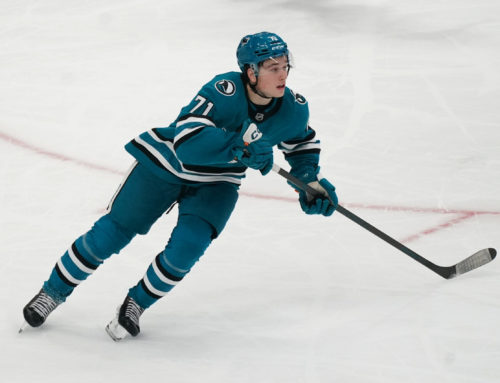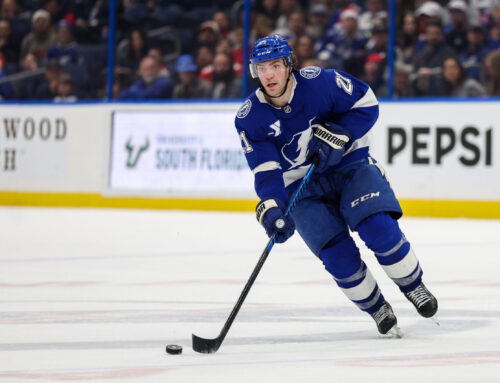
Which rearguard is the better fantasy hockey option – Jason Demers or Jason Garrison.
It's back to defensemen for this week's Cage Match, with an all Jason battle between Jason Demers and Jason Garrison. Which one is the better own for now, and down the road?
Career Path and Contract Status/Cap Implications
Both players defied the odds to get to the NHL, with Garrison (now 29) signed as an undrafted free agent by Florida at age 24 in 2008 and Demers (now 25) selected by the Sharks 186th overall in the 2008 entry draft. But they hit the ground running, as by the end of the 2009-10 season Garrison had appeared in 40 Panthers games and Demers in 51 for San Jose, after which both were in the NHL to stay.
Demers showed early promise, with 21 points in those 51 games; but then he struggled (only recording 40 points in his next 154) before bouncing back this year. Garrison had poor production early, with only 26 points in his first 113 games; but he broke out in 2011-12 with 33 points (including 16 goals – third highest among all NHL defensemen that year) just as he was set to be a UFA.
Garrison was rewarded for his breakout campaign with a six year, $27M deal (through 2017-18) that shocked fans and GMs alike given that he had only 59 career points when it was signed. Demers, on the other hand, still hasn't inked a big contract, having gone from his ELC to a two year, $2.5M deal, to his current one year, $1.5M contract. This makes Demers a cap bargain versus Garrison for the 2013-14 season, and in fact he currently sits within the top 15 in Capgeek's best defensemen bargains. And although the gap between Demers' salary and the $4.6M per year salary (not including bonuses) that Garrison receives will likely shrink after this season, chances are that Demers – who's set to be an RFA, not a UFA – will remain the far cheaper cap hit option for the next several years.
Ice Time (2013-14 through March 15th)
For Demers, this data should be useful since it hopefully will help explain some of the fluctuations in his production. With Garrison, we'll get to examine both his full seasons with Florida as well as his two campaigns in Vancouver (2012-13 under Alain Vigneault, and this season under John Tortorella).
|
Season |
Total Ice Time per game (with rank among team's defensemen) |
PP Ice Time per game (with rank among team's defensemen) |
SH Ice Time (with rank among team's defensemen) |
|
2013-14 |
19:18 (J.D.) – 4th 20:56 (J.G.) – 4th |
2:01 (J.D.) – 3rd 2:54 (J.G.) – 2nd |
1:14 (J.D.) – 5th 1:18 (J.G.) – 5th |
|
2012-13 |
18:37 (J.D.) – 6th 21:41 (J.G.) – 4th |
1:18 (J.D.) – 3rd 2:17 (J.G.) – 2nd |
1:18 (J.D.) – 5th 2:18 (J.G.) – 2nd |
|
2011-12 |
16:50 (J.D.) – 4th 23:41 (J.G.) – 2nd |
1:59 (J.D.) – 2nd 2:31 (J.G.) – 3rd |
0:10 (J.D.) – 7th 2:34 (J.G.) – 2nd |
|
2010-11 |
19:29 (J.D.) – 5th 22:17 (J.G.) – 2nd |
2:11 (J.D.) – 2nd 1:33 (J.G.) – 4th |
1:35 (J.D.) – 4th 3:08 (J.G.) – 2nd |
Demers' two worst years (2011-12 and 2012-13, when he scored only 16 points in 79 games while dealing with injuries) happened to coincide with his lowest Ice Times both overall and on the PP. But if you go back to 2009-10 when Demers posted a 21 points in 51 games, he had much lower Ice Time than even in those seasons, making this a bit of a cloudier picture. But still, with Demers now back above 19 minutes per game, including more than 2:00 on the PP, the outlook for the future is a bit better, especially given where things are with Dan Boyle (more on him below).
With Garrison, we can see a pretty clear picture as well, and it's one where he responds with production if he gets 2:30 or more of PP Ice Time per game. After all, his overall Ice Time in two seasons (2010-11 and 2011-12) with Florida differed by just above 6%, and his year to year difference in his total Ice Time in two seasons with Vancouver is mere seconds. Yet in both cases there was a much more pronounced difference in PP Ice Time, and his points totals responded.
Injuries and Draft/Trade Cost
Demers did miss 20+ games in two consecutive seasons, including due to a head injury just last year. Meanwhile, Garrison has missed one game since 2011-12, and no more than nine in any full season. Had Demers limped through this campaign as well, then it would've raised some ongoing concerns; but with him having stayed healthy for all of 2013-14 so far, concerns about recurring injury issues have been relegated to "back of the mind" status.
In terms of cost, Demers is owned in 14% of Yahoo leagues, compared to Garrison's 73%. Quite a jaw dropping difference, which signifies that it will cost you much, much more (in drafting or in trade) to get Garrison than it would to land Demers.
Secondary Categories & PDO (2013-14 through March 15th)
|
Season |
+/- |
Hits (per game) |
Blocked Shots (per game) |
Shots (per game) |
PP Points (per game) |
PDO (for 5×5) |
|
2013-14 |
+16 (J.D.) -8 (J.G.) |
0.82 (J.D.)
📢 advertisement:
0.79 (J.G.) |
1.46 (J.D.) 1.52 (J.G.) |
1.52 (J.D.) 2.37 (J.G.) |
0.14 (J.D.) 0.20 (J.G.) |
1006 (J.D.) 985 (J.G.) |
|
2012-13 |
-4 (J.D.) +18 (J.G.) |
1.45 (J.D.) 0.76 (J.G.) |
1.09 (J.D.) 1.23 (J.G.) |
1.23 (J.D.) 2.00 (J.G.) |
0.00 (J.D.) 0.13 (J.G.) |
980 (J.D.) 1038 (J.G.) |
|
2011-12 |
-8 (J.D.) +6 (J.G.) |
1.05 (J.D.) 1.65 (J.G.) |
1.02 (J.D.) 1.61 (J.G.) |
1.28 (J.D.) 2.18 (J.G.) |
0.09 (J.D.) 0.15 (J.G.) |
979 (J.D.) 1008 (J.G.) |
|
2010-11 |
_19 (J.D.) -2 (J.G.) |
1.16 (J.D.) 1.86 (J.G.) |
0.96 (J.D.) 1.74 (J.G.) |
1.40 (J.D.) 1.59 (J.G.) |
0.08 (J.D.) 0.04 (J.G.) |
1016 (J.D.) 997 (J.G.) |
Once again we see a correlation between stats (in this case, lower number of Shots) and poor output by Demers, so his owners must be happy to see that his Shots total is higher this season than any of his past three. It's a similar situation with Garrison in that when his Shots totals have been more than two per game, he tends to produce, and he too is firing more Shots this season than in any of these others. Their PP production is in generally line with their PP Ice Time.
One clear trend is Garrison's decline in Hits and Blocked Shots, as after he signed his big contract his output in those areas has dropped dramatically. Even playing under John "block everything" Tortorella hasn't resulted in his Blocked Shots pace returning to the level it was back in his years with Florida. This illustrates a key point in fantasy hockey, which is for categories like Hits and Blocked Shots you have to pay close attention to year to year output, since sometimes a guy who was a beast in these kinds of categories for a couple of years (or even longer) can suddenly become a merely average or even below average contributor. And the reverse can occur as well. So be sure to keep tabs on this kind of thing with your players.
The PDO numbers for Demers are interesting because they were the lowest among San Jose defensemen for each of the past two seasons, which happened to coincide with his poorest production. Finally this year his PDO is back over 1000, and sure enough his production has jumped as well. What's especially encouraging is that his PDO number is well below his career high (1016 in 2010-11) and it's still the third lowest among Sharks d-men for this season. This suggests his points output has room to increase in future seasons.
Garrison's PDO has been more varied, and usually fell in the middle among his team's defensemen. What's interesting is that by far his highest PDO (1038 in 2012-13, which was above the 1030 "normal" threshold) came in what could be considered a down season. Go figure. For what it's worth, Garrison is also the better PIMs producer (averaging a career high 0.77 per game this season), with Demers never having averaged 0.5 PIMs per game in any season, including this one.
Who Wins?
This was a very interesting Cage Match in that there weren't any big surprises in what the data revealed, other than perhaps some of Garrison's secondary stats having taken a nose dive. In short, it seems like both players do well when they shoot more and get PP Ice Time, less so when they don't.
Of course when value vs. cost is so lopsided, as it is here (with Garrison being owned in five times as many leagues as Demers!), we'd need to see that Garrison is far and away a better option than Demers to justify the cost differential, and at this point he just isn't.
Demers is especially intriguing because even if Dan Boyle re-signs with San Jose, it looks as if Boyle simply isn't the player he was while putting up between 48 and 57 points for four consecutive seasons as recently as 2008 to 2012. Instead, Boyle is scoring at below a 0.5 points per game pace for the second consecutive year (after having not done so for even a single season in more than ten years!) despite getting the most PP Ice Time of any Shark defenseman by far (roughly 1:30 more per game than either Matt Irwin or Demers) and even though the Sharks offense has rebounded to once again be in the top five in NHL goals scored. What's more, the crop of defensemen set to be UFAs is far from a who's who of offensive talent, so it's not like San Jose is posed to bring in a high scoring stud defenseman for 2014-15.
What this all means is Demers not only will likely re-sign with San Jose (not a big surprise since he'll be an RFA), but he'll be poised to be at least as integral to the team's offense next season as he has been for 2013-14, if not a lot more so. In other words, Demers should be put in a position to at least replicate (if not significantly improve upon) his points production from this season. It also helps that his PDO numbers are consistent with reaching this conclusion.
As for Garrison, with none of the other top four Vancouver defensemen (Alexander Edler, Kevin Bieksa, Dan Hamhuis) set to be free agents until after 2016-17, we shouldn't expect his Ice Time to undergo a major change for the better. And he's actually in danger of being passed by Christopher Tanev (who, like Demers, is only making $1.5M this season) in overall Ice Time per game.
And in terms of Vancouver as a team, their core players are aging and it looks like they'll be entering a rebuilding phase, whether they officially call it that or not. If that indeed happens, then we can't help but expect a trickle down negative effect on the productivity of their defensemen, including Garrison.
And although Garrison did very well in 2011-12 for a Panthers team that finished fifth from last in the NHL in goals scored, the difference there was he was clearly one of only two real minute-eating defensemen (the other was Brian Campbell) and got 23:41 of Ice Time per game, which is nearly three minutes more than he's receiving in 2013-14 for the Canucks. If Vancouver goal totals go south, then for sure the effect will be felt on Garrison, who won't be able to command enough top minutes to make up for the drop in talent/performance around him.
At this point, I'm taking the severely undervalued Demers over the arguably overvalued Garrison in a points only league, and perhaps even in ones that heavily factor in Hits, Shots, PIMs, and Blocked Shots, where in some cases Garrison's contributions have fallen, making his value even more inflated.
| Brandon Saad vs. Jaden Schwartz | |||
| 5 Common Fantasy Hockey Deadline Mistakes – 2014 | |||
| Brad Richards vs. Mike Ribeiro |





 SEA
SEA CHI
CHI OTT
OTT EDM
EDM DAL
DAL STL
STL L.A
L.A ANA
ANA FLA
FLA CBJ
CBJ COL
COL
